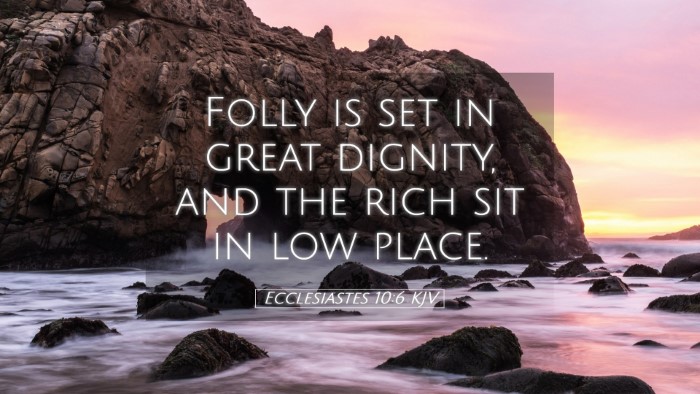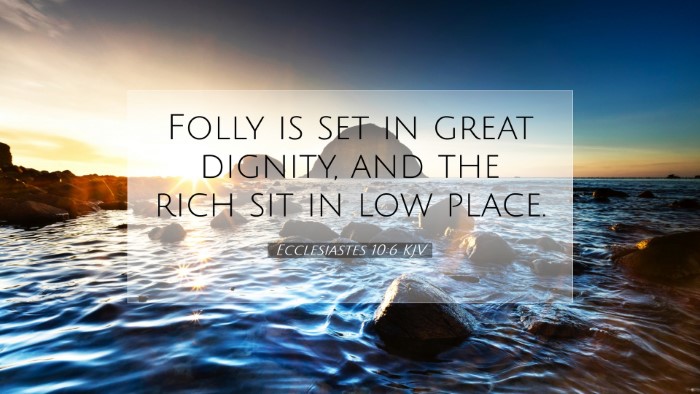Commentary on Ecclesiastes 10:6
Ecclesiastes 10:6 states:
"Folly is set in great dignity, And the rich sit in a lowly place."
This verse presents a striking contrast between the fortunes of the wise and the foolish, compelling its readers to reflect on the nature of wisdom, folly, and the societal roles attributed to them. Below is a combined commentary from several public domain sources, elucidating the profound insights drawn from this passage.
Analysis of Folly and Wisdom
Matthew Henry suggests that the verse highlights the unfortunate reality where folly is exalted, while wisdom often finds itself undervalued or ignored. He argues that this reflects the corrupt human condition where the world oftentimes rewards lack of discernment and foolish behavior.
Albert Barnes expands on this theme, indicating that "folly" is often mistaken for wisdom in society. He notes that this should serve as a caution for believers, as it can lead to disillusionment if one is swayed by societal norms rather than divine wisdom.
Adam Clarke interprets the "great dignity" of folly as a powerful commentary on the governance of human affairs, where those who lack understanding often rise to positions of influence. He asserts that this reality should evoke a sense of urgency for true wisdom and discernment amongst the faithful.
The Role of Wealth and Wisdom
The latter part of the verse, "The rich sit in a lowly place," can be understood in multiple layers. Matthew Henry notes that this indicates a reversal of expected social structures, where the wealthy, who are assumed to wield influence, may surprisingly find themselves in positions of low esteem due to their lack of wisdom.
Barnes comments that worldly wealth does not guarantee respect or acceptance among the wise. He points out that there are instances where the rich may occupy humble positions, indicating that earthly status is transient compared to spiritual standing.
Clarke reflects on the idea that true honor comes from integrity and wisdom rather than material wealth. He emphasizes that genuine richness is found in character and understanding, not simply in economic status.
Implications for Society
This verse holds profound implications for contemporary society. It challenges worldly perceptions of success and prompts reflection on what constitutes true dignity and worth. As observed by Matthew Henry, this presents a case for humility amongst the wise – a reminder that divine evaluation often stands in stark contrast to human judgment.
Barnes urges readers to remain vigilant against the allure of folly that society may celebrate. He encourages the church community to uphold biblical wisdom, emphasizing the necessity of discernment in a world that often values superficial qualities over substantive character.
Adam Clarke concludes that the faithful should aspire not only to possess wealth but more importantly, to embody wisdom that springs from a relationship with God. This will foster a lifestyle that celebrates true honor and respect, regardless of societal valuations.
Reflection and Application
As pastors, students, theologians, and scholars ponder the implications of Ecclesiastes 10:6, they are called to engage critically with the realities of their own contexts. Here are some reflective inquiries and applications:
- Discernment: How can we cultivate discernment in our lives and churches to exalt wisdom over folly?
- Leadership: In what ways can leaders exemplify humility and wisdom, challenging societal norms that equate wealth with authority?
- Community Engagement: How might our congregations address the contrast between societal values and biblical principles to impact the wider community?
Ultimately, Ecclesiastes 10:6 serves as a poignant reminder that true value and elevation in God’s eyes stem from a life grounded in wisdom, regardless of external circumstances. By aligning our aspirations with this truth, we can reflect Christ more accurately to the world.


